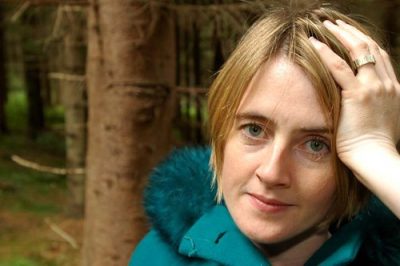
Over the years of writing this blog, there’s been interviews conducted via email, Skype and phone, but it’s always nice to be able to do them in person. So it happens one very nice July day that I find myself driving deep through the Midlothian countryside, south of Edinburgh. I’m less than twenty miles from Scotland’s capital city, but it’s as if I’m miles from anywhere, as I head to my rendez-vous. It’s the lady herself who opens the door and fixes me a coffee.
She’s just released her new album, Karine Polwart’s Scottish Songbook. I start by asking how the album came into being. She explains that the basis of the idea was born out of the exhibition on Scottish pop music that took place last year at the National Museum of Scotland in Edinburgh (as one of many attendees, I can attest that it was very good). Alongside this was the night of Scottish pop in a folk style that she curated at the Leith Theatre. ‘The amount of effort for one night led to four days in a studio,’ with her realising quickly just how important the songs were. ‘How can you make a go of them in a way that’s not shit karaoke?’
Don’t think that a cover album is simply a holding operation or an easy option, either. ‘I’ve never put so much effort in [to making a record]!’ she says. The eleven songs within are radical interpretations of songs from the last fifty years of Scottish popular music, done in a radically different style. ‘If you’re a traditional singer in the folk idiom, you’re going to be interpreting [the songs] raw.” The album opens with her cover of the Waterboys’ ‘The Whole Of The Moon.’ This gives an idea to what her approach of the whole album was like.
The original is perhaps marked by the distinctive trumpet playing of Roddy Lor
But whilst it might seem that it’s a raw look at what the songs might look at in written, rather than recorded form, the approach to the recorded form of her interpretations adds another level to the songs. Her cover version of Strawberry Switchblade’s ‘Since Yesterday’ features the voice of her late Grandfather. Though the recording was made in the 1980s, it was only this year that she heard his voice. ‘How I heard [‘Since Yesterday’] is a song about aging and loss. It allows me to set up the meaning of the song without staging.’
There was a massive list of songs originally considered for the project – including many that were featured in the performance that were not included in on the album. I ask her if she envisages making a second volume. ‘No concrete plan!’ she tells me. The amount of work involved in this project ‘put paid to the idea that I could just rattle one off!’
I ask her if she thinks there’s a noticeable difference between pop music and folk music at this point in history? ‘Much less now,’ she says, thoughtfully. ‘Loads of the songs stand up in the same way that folk songs do. If you can pull away the layers, it’s a folk song.’ Her favourite song on the album is her version of Big Country’s ‘Chance.’ ‘I really wish [Stuart Adamson]’ was still alive,’ she tells me with feeling.
Of course one way in which there are differences between folk and pop singers is the issue of accents. ‘Folk singers have always sung in their own accents,’ she tells me proudly.’ Yet for many years the same could not be said of many in the rock and pop world, who preferred to use an American accent, despite the fact that their roots were far closer to home. I suggest the Proclaimers as an act who stuck to their guns. ‘the Proclaimers nailed it,’ she concurs. Thinking of others, she adds’ you can tell Eddi Reader’s Scottish, she’s not labouring it.’
As well as working on this collection, she has done a number of collaborations. Her collaboration with Sushil K. Dade (AKA Future Pilot AKA) singing ‘Shenandoah’ on his fourth album, Secrets From The Clockhouse. Having been introduced backstage at Celtic Connections, it was her first foray into something ‘cool and not folky’ – the album also featured members of bands including the Go-Betweens, Belle & Sebastian and Sonic Youth. Ten years ago she also ended up collaborating with a number of 17 Seconds favourites on the Burns Unit project.
‘ It was a funded project that grew out of Burnssong, Burnssong was a funded project,’ she recalls. ‘We were sent to a house to write songs for a week.’ The ‘we’ included not only Dade, but the likes of Emma Pollock and King Creosote. ‘Now there’s a big growth in these collaborations.’ She recalls the experience as giving her the opportunity to work with a good bunch of people, adding ‘these projects don’t work if everyone’s a maverick.’
Scotland’s certainly a
Hopefully it’s not a situation that will remain that way for long. Shortly after we talk, the album becomes her first UK Top 40 album, and reaches no.2 in the Scottish charts. And the next twelve months look set to be just as busy. She’s playing the biggest venues she’s ever played, including the Barbican in London and the Usher Hall in Edinburgh. Not only that but she’s working on a new piece of theatre, inspired by supernovas, Greek myth and nuclear waste disposal.
And with that, we have to bid farewell, she to another interview with the New Statesman, 17 Seconds to return to 17 Seconds Towers. But it’s to listen yet again to the Scottish Songbook, a fantastic
Karine Polwart’s Scottish Songbook is out now on Hegri music.


